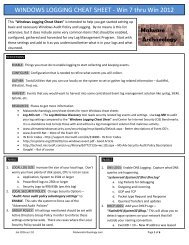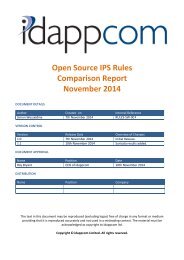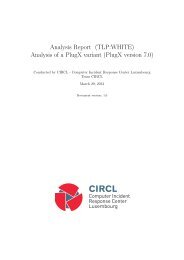The use of the Internet
The use of the Internet
The use of the Internet
Create successful ePaper yourself
Turn your PDF publications into a flip-book with our unique Google optimized e-Paper software.
24<br />
THE USE OF THE INTERNET FOR TERRORIST PURPOSES<br />
laws provide States with <strong>the</strong> benefit <strong>of</strong> strong foundational legal provisions as a point<br />
<strong>of</strong> departure for <strong>the</strong> development <strong>of</strong> domestic legislation. A key benefit <strong>of</strong> <strong>the</strong> <strong>use</strong> <strong>of</strong><br />
model provisions as a basis for national legislation is <strong>the</strong> facilitation <strong>of</strong> international<br />
cooperation, including through <strong>the</strong> mitigation <strong>of</strong> conflicts arising out <strong>of</strong> misinterpretation<br />
<strong>of</strong> provisions in different legal systems (for example, between common-law and<br />
civil-law jurisdictions) and with respect to dual criminality requirements. 71 (See discussion<br />
in section V.F.5 below.)<br />
1. Commonwealth<br />
69. <strong>The</strong> Commonwealth Model Law on Computer and Computer Related Crime<br />
(2002) was drafted on <strong>the</strong> basis <strong>of</strong> <strong>the</strong> Council <strong>of</strong> Europe Convention on Cybercrime. 72<br />
<strong>The</strong> Model Law is aimed at leveraging <strong>the</strong> similarities in <strong>the</strong> legal traditions <strong>of</strong> Commonwealth<br />
member States 73 to promote <strong>the</strong> harmonization <strong>of</strong> both substantive and<br />
procedural aspects <strong>of</strong> combating cybercrime and to promote international cooperation.<br />
<strong>The</strong> Commonwealth Model Law is consistent with <strong>the</strong> standards defined by <strong>the</strong> Council<br />
<strong>of</strong> Europe Convention on Cybercrime.<br />
2. Commonwealth <strong>of</strong> Independent States<br />
70. Member States <strong>of</strong> <strong>the</strong> Commonwealth <strong>of</strong> Independent States (CIS) have also<br />
adopted model legislative acts and guidelines, aimed at harmonizing <strong>the</strong> national legislative<br />
systems, taking into account international experiences in <strong>the</strong> fight against terrorism.<br />
<strong>The</strong>se model provisions reflect international legal standards, adapted to <strong>the</strong><br />
needs <strong>of</strong> CIS member States. 74 For example, article 13 <strong>of</strong> <strong>the</strong> Model Law on <strong>the</strong> regulatory<br />
framework <strong>of</strong> <strong>the</strong> <strong>Internet</strong> 75 provides model provisions with respect to countering<br />
<strong>the</strong> <strong>use</strong> <strong>of</strong> <strong>the</strong> <strong>Internet</strong> for illegal purposes.<br />
3. International Telecommunication Union<br />
71. <strong>The</strong> International Telecommunication Union (ITU) is a specialized agency <strong>of</strong> <strong>the</strong><br />
United Nations that plays a leading role in cybercrime issues. ITU has developed <strong>the</strong><br />
Toolkit for Cybercrime Legislation (2010) to promote harmonized national cybercrime<br />
71 Pursuant to <strong>the</strong> principle <strong>of</strong> dual criminality, extradition may be possible only in cases in which <strong>the</strong> act on <strong>the</strong><br />
basis <strong>of</strong> which extradition has been requested is punishable in both <strong>the</strong> requesting and <strong>the</strong> requested State.<br />
72 For more information, see www.<strong>the</strong>commonwealth.org/shared_asp_files/uploadedfiles/%7BDA109CD2-5204-<br />
4FAB-AA77-86970A639B05%7D_Computer%20Crime.pdf.<br />
73 As at <strong>the</strong> date <strong>of</strong> <strong>the</strong> present publication, <strong>the</strong> 53 member States <strong>of</strong> <strong>the</strong> Commonwealth were: Antigua and Barbuda,<br />
Australia, Bahamas, Bangladesh, Barbados, Belize, Botswana, Brunei Darussalam, Cameroon, Canada, Cyprus,<br />
Dominica, Gambia, Ghana, Grenada, Guyana, India, Jamaica, Kenya, Kiribati, Lesotho, Malawi, Malaysia, Maldives,<br />
Malta, Mauritius, Mozambique, Namibia, Nauru, New Zealand, Nigeria, Pakistan, Papua New Guinea, Rwanda, Saint<br />
Kitts and Nevis, Saint Lucia, Saint Vincent and <strong>the</strong> Grenadines, Samoa, Seychelles, Sierra Leone, Singapore, Solomon<br />
Islands, South Africa, Sri Lanka, Swaziland, Tonga, Trinidad and Tobago, Tuvalu, Uganda, United Kingdom, United<br />
Republic <strong>of</strong> Tanzania, Vanuatu and Zambia.<br />
74 As at <strong>the</strong> date <strong>of</strong> <strong>the</strong> present publication, <strong>the</strong> 11 member States <strong>of</strong> <strong>the</strong> Commonwealth <strong>of</strong> Independent States<br />
were: Azerbaijan, Armenia, Belarus, Kazakhstan, Kyrgyzstan, Republic <strong>of</strong> Moldova, Russian Federation, Tajikistan, Turkmenistan,<br />
Ukraine and Uzbekistan.<br />
75 Annex to resolution 36-9 <strong>of</strong> <strong>the</strong> Inter-Parliamentary Assembly <strong>of</strong> <strong>the</strong> members <strong>of</strong> <strong>the</strong> Commonwealth <strong>of</strong> Independent<br />
States, adopted on 16 May 2011.







